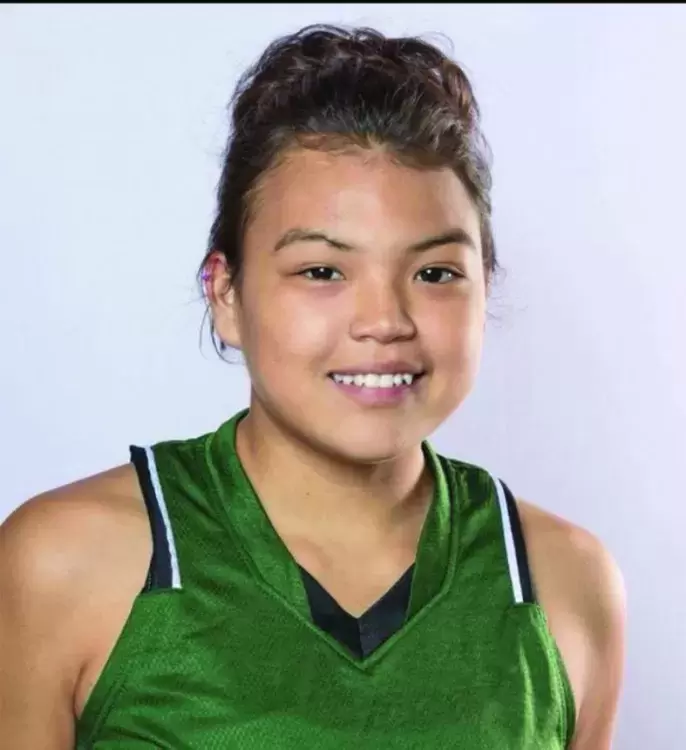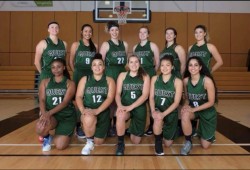This fall, Ahousaht member Shakayla Thomas made the big leap from a remote First Nations community to full-time attendance in university. And her basketball skills were all part of the package.
Shakayla attends Quest University Canada, a private non-profit university located in Squamish, in the unceded traditional territory of the Squamish Nations. While the talented ballplayer had a number of schools interested in signing her, Quest offered the best learning environment, according to her Dad, Tom Paul.
Paul noted that graduates from Maaqtusiis do not typically make a straight transition to university. More often, they may take a year or two off.
"As parents, we did not want her to go to VIU or Camosun. We wanted her a little more isolated. When we went to go visit Quest, we fell in love with it," Paul said. Both the ideology and the size of the institution felt right.
"It's perfect for a transition for kids coming from small communities," he said. "There are 700 students, with class sizes of 20."
Timing proved to be a problem, however. Because Shakayla was unable to relocate to campus until September, she missed the summer pre-practice season, and became ineligible for a scholarship.
"I was a walk-on. I didn't get to Squamish until September. They did know I was coming, but they weren't able to give me a scholarship," she said. She will be able to seek a scholarship next season, however.
"I live on-campus, in residence," she said. "It's definitely different, living with people I never knew."
That late arrival also meant she does not room with her fellow athletes. Again, that will change next season.
While Paul, Shakayla and her mom, Marsha Mack, are all Ahousaht members, they all lived in Nanaimo. Moving back to their home community was a big change.
"I came into the picture when Shakayla was in Grade 6. I'm a step-dad,” Paul explained. "I moved my family to Ahousaht in 2010, for employment, and we stayed here.
"It was a bit of a transition for her, moving to a small community. She played basketball all through high school. She played in all the Native tournaments. She did well.
"She has a good head on her shoulders; she knows what is right. Our long-term goal was to get her to university."
That meant continuous encouragement to get out and exercise, to practice hard and to avoid pitfalls like drinking and drugs. In her first year at Maaqtusiis, Shakayla played in the 2012 Junior All-Native Tournament, hosted by Hesquiaht First Nation in Port Alberni. She and her Mystic Sunz teammates won the girls championship.
While living in Nanaimo, Shakayla spent much of her free time at the Neutral Zone, which is affiliated with the Friendship Centre – Tillicum House. The Neutral Zone provided support and activities for both children and adults.
"It was mainly First Nations, but it was also open to the general public," she said, explaining, "for people who didn't have much."
For many, it was a chance to get a good meal. For Shakayla, it was a chance to play basketball.
Paul notes that Shakayla has been encouraged to fully embrace her Nuu-chah-nulth culture.
"We had a traditional coming-of-age party for her, with her family,” he said. "She does attend cultural events.”
Paul said Shakayla learned the spiritual cleansing/bathing ritual known as oosimch. He said that training worked in reverse when he was having difficulty dealing with a death and an upcoming funeral. A counsellor suggested that he needed oosimch.
"Shakayla attended the ritual – at six in the morning. She was rubbing her eyes and half-awake. It still touches me to this day. There I was, up to my chest in ice-cold water, praying and screaming and doing what I had to do."
Paul helped Shakayla write a paper for her application to Quest. The piece described the natural laws of Shakayla’s community in Ahousaht.
"That is what is going to drive her through university,” Paul said. “Remembering that – the simplicity of how our ancestors lived – you can marry that with today's [realities] - whether you're struggling with university, whether you're getting up in the morning to go to the gym, or the academics. Remember how you got there; remember what you learned in the potlatch, in the ceremonies, in the culture. It will drive you."
Shakayla said Quest does not have many First Nations students.
"But they do have connections with the Squamish Nations. They bring elders to campus, to do lectures and presentations. Recently, they did a presentation on residential schools to one of the courses."
As a Nuu-chah-nulth member grounded in her own culture, she is finding opportunities to share her language and culture with her non-indigenous classmates. And many are fully receptive, she noted.
"I do speak with my roommates and friends. They ask me questions, because they are curious," she said. "I do talk about where I'm from and what our beliefs are."
Paul feels strongly that education is the key for First Nations to move beyond the toxic legacy of the residential schools and the resulting intergenerational trauma.
Shakayla said she does recognize the multi-generational effects of the residential school horror and of the embedded racism in Canadian history.
"The way they were treated, it was brought along to future generations that you were not good enough to go further," she said. "They were told they were never going to amount to anything and they needed other people to tell them what they were good at."
Shakayla said the course system at Quest is not typical for post-secondary schools.
"Classes run Monday to Friday. You chose from a morning class, 9 to 12, or afternoon, 1 to 4. You chose the course online. Right now, I'm in afternoon."
As she explained, instead of juggling five courses for a full term, students complete one block in three and a half weeks, then proceed to the next block. And by the way, those classes are limited to 20 students.
"Right now, I'm taking Democracy and Justice," she said. "Our workload is bigger. That is to get a better focus on the course. We do a lot of essays and bigger papers.”
The course ends on a Wednesday, followed by Block Break. On Monday, it's a whole new course.
"My next course is Q Skills," she said. The course is designed to build up the math skills that will be required as the student progresses towards a degree.
Shakayla said while her first choice to obtain a master’s degree in psychology, she might decide to move into social work.
Asked if her goal is to practice those skills in her home community, she said her first choice would be to start in a new small community for a few years, before bringing her skills and experience back to Ahousaht.
For now, it is Democracy and Justice, plus basketball – lots of it.
"It's very intense. I had to get used to a lot more practices – and just using the actual basketball terms," she said. Part of college ball is being able to express it in accepted technical terms. It's different from high school.
Shakayla agrees that basketball, or sports in general, provide an opportunity to acquire an education. And she had plenty of talented teammates back home.
"There is so much talent here. Shakayla is not the only kid who could use basketball as a gateway to university,” Paul said.
"I'm hoping to drag more people out here," Shakayla said. "This is a really good school. You interact with everybody - especially having small classes." For young people from isolated communities, it's a growing experience, she said.
Shakayla said student ballplayers do get some free time on Sundays. Squamish does have a Friendship Centre.
"There are a couple of tutors who go down to the Friendship Centre on Sundays to do some teaching. I'm thinking about going down there to help. They recently had a pow-wow."








